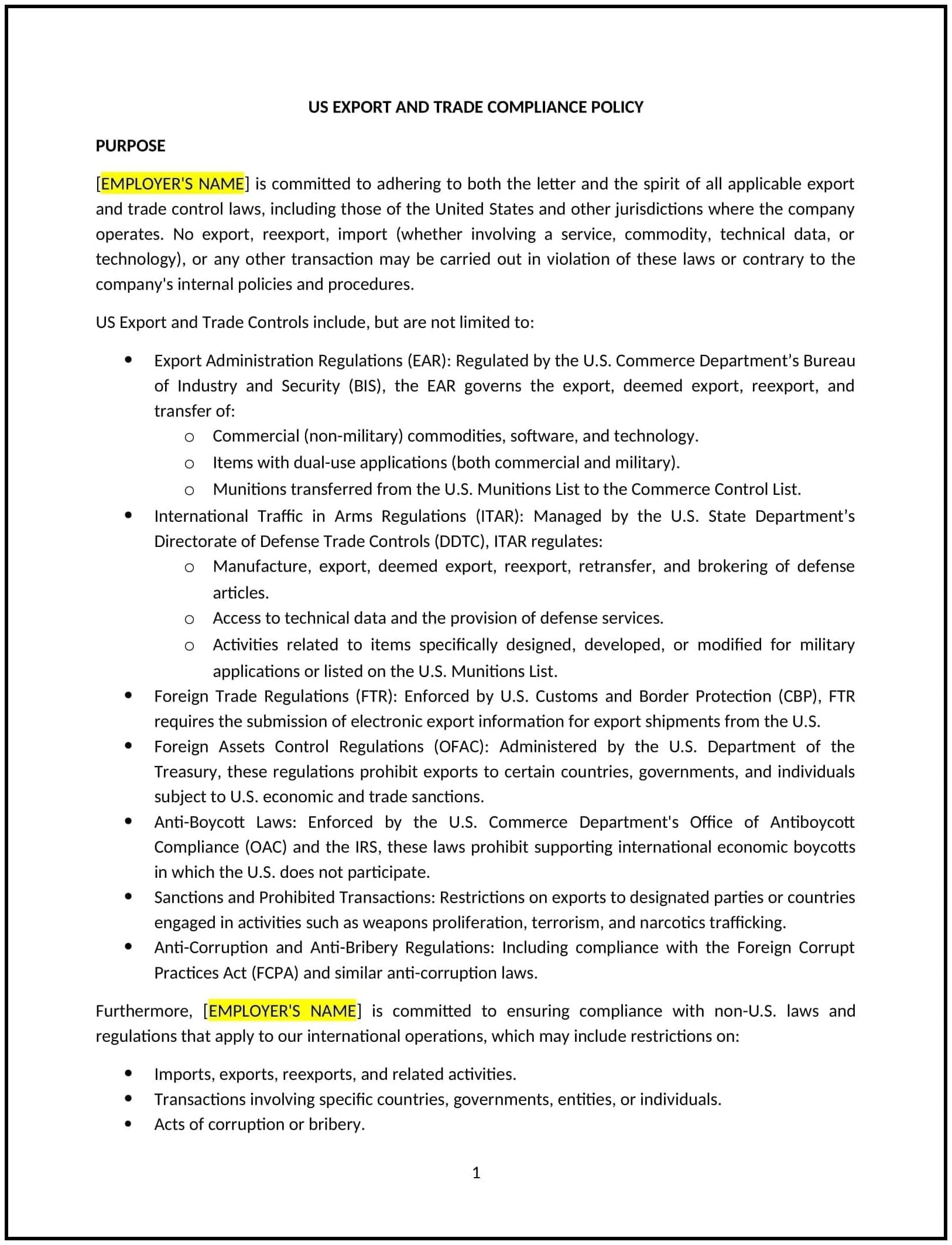US export and trade compliance policy (Michigan): Free template
Got contracts to review? While you're here for policies, let Cobrief make contract review effortless—start your free review now.

Customize this template for free
US export and trade compliance policy (Michigan)
A US export and trade compliance policy outlines the guidelines that Michigan businesses must follow to ensure their activities comply with U.S. laws and regulations governing international trade and exports. This includes compliance with the U.S. Export Administration Regulations (EAR), International Traffic in Arms Regulations (ITAR), economic sanctions, and anti-boycott laws. The policy is designed to prevent the illegal export of sensitive goods, services, and technology, as well as to mitigate the risk of violations that could result in penalties, fines, or loss of export privileges.
By implementing this policy, businesses can protect themselves from legal risks, ensure they are abiding by U.S. trade laws, and maintain strong, legally compliant relationships with international customers and partners.
How to use this US export and trade compliance policy (Michigan)
- Define the scope of exports: Clearly identify which products, services, technologies, or information fall under the scope of the policy and are subject to U.S. export controls. This includes determining whether any of your goods or services are considered "dual-use" (i.e., both civilian and military applications).
- Conduct a risk assessment: Regularly assess the risks associated with international transactions, including the identification of customers, suppliers, and partners in countries subject to U.S. sanctions or embargoes.
- Establish procedures for export licenses: Specify the process for obtaining the necessary export licenses before shipping controlled products, technologies, or services overseas. The policy should outline when a license is required and who is responsible for ensuring compliance.
- Monitor sanctioned and embargoed countries: Ensure the business is aware of and follows U.S. government regulations regarding trade with sanctioned countries or entities. The policy should clearly define the countries and entities subject to sanctions and provide guidance on prohibited transactions.
- Train employees on compliance: Educate relevant employees about the US export and trade compliance requirements, including how to screen customers and transactions for compliance. The policy should include ongoing training and awareness programs.
- Implement internal controls: Establish internal controls to track and manage export activities, such as keeping records of export transactions, licenses, and communications with international partners.
- Conduct audits and reviews: Regularly review and audit export transactions and compliance procedures to ensure they are in line with the policy. Audits should identify any discrepancies or potential risks, helping to proactively address issues before they escalate.
- Report violations: Specify the process for reporting suspected violations of the policy, including an internal reporting system that allows employees to flag any potential non-compliance with export and trade regulations.
- Review and update the policy: Periodically review the policy to ensure it reflects changes in U.S. trade laws, regulations, or business operations. Updates should be made in response to any shifts in legal requirements, international trade agreements, or business activities.
Benefits of using this US export and trade compliance policy (Michigan)
This policy provides several key benefits for Michigan businesses:
- Mitigates legal risks: By ensuring compliance with U.S. export and trade regulations, businesses can avoid penalties, fines, and the loss of export privileges, helping to protect the company from legal and financial risks.
- Protects company reputation: Maintaining compliance with trade laws helps preserve the company’s reputation with both domestic and international customers, as it demonstrates a commitment to lawful and ethical business practices.
- Reduces the risk of illegal exports: The policy helps identify and prevent the illegal export of sensitive products or technologies, which could otherwise lead to severe consequences under U.S. law.
- Enhances business operations: By implementing clear compliance processes, businesses can streamline their international trade activities while minimizing the risk of delays or disruptions caused by non-compliance issues.
- Fosters trust with international partners: A strong commitment to compliance can build trust with international partners, showing that the business is a responsible, law-abiding entity that follows international trade standards.
- Supports continuous improvement: Regular audits and reviews of compliance procedures provide opportunities for ongoing improvements, ensuring that the business remains adaptable to changes in trade laws and regulations.
Tips for using this US export and trade compliance policy (Michigan)
- Communicate the policy clearly: Ensure that all employees involved in international trade, including sales, procurement, and logistics, are aware of the policy and understand the requirements for compliance. Include the policy in employee handbooks and provide training during onboarding.
- Designate compliance officers: Assign specific individuals or teams to be responsible for export compliance within the organization. These individuals should ensure that all employees adhere to the policy and are available for questions and support.
- Stay updated on regulatory changes: Regularly check for updates to U.S. export laws, sanctions, and international trade agreements. This will help ensure that the policy remains compliant with the latest regulations and avoids violations.
- Provide ongoing training: Regularly train employees on changes in export regulations, including how to screen customers, obtain export licenses, and manage transactions in accordance with U.S. law. Keep employees informed of new compliance requirements or changes to the list of sanctioned countries and entities.
- Review contracts carefully: Before entering into agreements with international customers or partners, review contracts to ensure they do not violate export regulations. Include language in contracts that reinforces compliance with U.S. export and trade laws.
- Conduct periodic audits: Periodically audit international transactions and export activities to ensure compliance with the policy. Identify any discrepancies, missed licenses, or violations early to address them promptly.
- Implement robust internal controls: Use tools and systems to monitor export activities and ensure that all transactions are compliant with the policy. Set up an approval process for exporting sensitive materials or engaging with sanctioned countries.